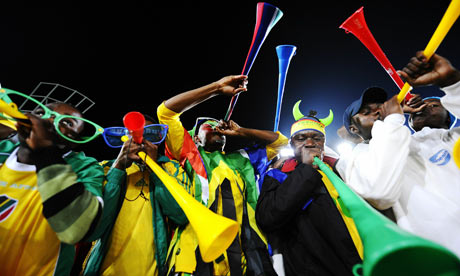S
Sakon Shima
Guest
World Cup 2010 : BBC may offer vuvuzela-free matches
South Africa defends plastic horns which have sparked global debate over loud drone and are selling out in Britain
<figure>

South African World Cup organisers say the vuvuzelas are loved by people around the world. Photograph: Gianluigi Guercia/AFP/Getty Images
</figcaption> </figure> The BBC was investigating the possibility of transmitting an alternative "vuvuzela free" version of its World Cup coverage tonight, as the fierce debate over the buzz of the horn looked set to be heading for football grounds all over Britain. As players, fans and coaches weighed in on whether the loud drone of the plastic horns was an annoying irritant or joyful expression of African culture, South African organisers hit back and encouraged visiting fans to export them back to their own countries.
At the same time, fans in Britain have been snapping up the horns at the rate of one every two seconds and suppliers claimed the UK had been gripped by "vuvuzela fever". "Vuvuzelas are here to stay and will never be banned," said Rich Mkhondo, a spokesman for the local World Cup organising committee. "People love the vuvuzelas around the world. Only a minority are against vuvuzelas." The Premier League and the Football League said there was nothing in their rules to stop supporters bringing them to English grounds but the decision would rest with individual clubs.
"There is a good chance they will end up in our grounds because people will bring them back from the World Cup," said a Football League spokesman. "It is a matter for individual clubs, as is the case with drums and other musical instruments." The drone of the vuvuzela has sparked an international debate since the tournament's launch on Friday, with broadcasters inundated with complaints and arguments raging on radio phone-ins. The BBC has received 220 complaints and, while it is committed to reflecting the atmosphere in the stadiums on its main coverage, it is believed to be looking into providing a so-called "clean" feed that would strip out the majority of crowd noise, via the red button.
South African organisers insisted today they were an important part of the atmosphere and would not be banned, despite the World Cup organising committee chief executive, Danny Jordaan, saying at the weekend that he personally preferred the sound of singing. Critics have argued that the constant drone masks the ebb and flow of the game and drowns out the noise of the crowd. The Danish goalkeeper Thomas Sorensen said after today's match with Holland that the constant noise meant he had to be no more than 10 yards away from his teammates and have eye contact to pass any messages.
Following his opening game, Argentina's Lionel Messi said: "It is impossible to communicate, it's like being deaf." But the South African goalkeeper Itumeleng Khune, mindful of the value of home advantage, said after his team's opening match that there weren't enough vuvuzelas in the stadium and called on supporters to make more noise. Even in South Africa, opinion is divided. Some put the wave of international criticism down to the effect of vuvuzelas being blown by enthusiastic visitors rather than the more expert exponents at South African Premier League matches.
But the organising committee called on overseas fans, who have been snapping up the horns, to export them. "The vuvuzela is now an international instrument," said a spokesman. "People will buy them and stuff them in their suitcases and take them home." England fans in the UK appear to be heeding his call; Sainsbury's sold 22,000 red vuvuzelas – or "Vu Vu horns" as it brands them – in 12 hours before England's game – one every two seconds. The supermarket chain has ordered 25,000 extra horns but thinks it may run out before Friday's game against Algeria.
There were none left at Sainsbury's in Emmersons Green, near Bristol. A few miles away in Chippenham, Wiltshire, half a dozen remained on the shelves.
Mike Brown was buying two for his children. "I could be making a terrible mistake but I think I'm going to have to make a rule that they can only blow them during the actual games. But the kids wanted them and I can't resist it when they get excited about something like the World Cup." Amazon said sales had increased by 1,000%. David Broughton, from Northamptonshire-based company thevuvuzelaman.co.uk, said the country was gripped with "vuvuzela fever".
"We sold 1,000 online over the weekend. Someone in Dubai has asked for 10,000. If anyone knows of half a million vuvuzelas lying around, they could get very rich," he said. World Cup organisers tried to draw a line under the issue of whether the instruments were good for the tournament. "This is a world event hosted by South Africa. As our guests, please embrace our culture and the way we celebrate," said the spokesman. "You either love them or you hate them. We in South Africa love them."










